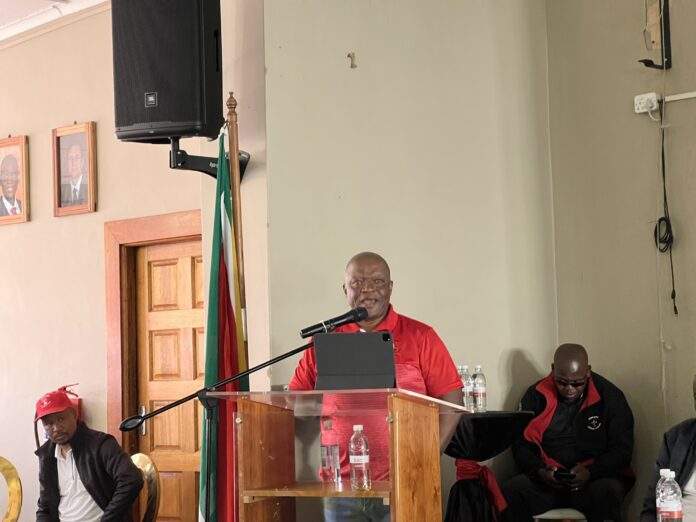South Africa is faced with a huge challenge of keeping its borders intact to prevent the influx of illegal immigrants into the country.
However, this has been a serious cause for concern for many years as porous borders facilitate criminal activities, lack of management at rail crossings, inadequate monitoring of goods entering and exiting the country, and fragmented agencies overseeing ports of entry.
Based on these challenges, president of Police and Prisons Civil Rights Union (Popcru), Zizamele Cebekhulu-Makhaza, stated that it was worrying that the authorities were failing to address border control issues.
“After years of disorganised management and underinvestment in border control, South Africa’s borders have been transformed into corridors of crime, enabling syndicates and criminal networks to conduct illegal cross-border activities largely uninterrupted. Border control is thus one of the most pressing issues in our country’s fight against crime, as failing borders in turn facilitate activities such as sex trafficking, poaching, gun crimes, theft, hijacking, fraud and financial crimes, and many more,” said Cebekhulu-Makhaza.
He also said it has been a major concern that several rail crossings between South Africa and neighbouring countries are not managed at all.
“The border between South Africa and Lesotho is highly porous, allowing people to easily cross the border to steal cattle. Illegal immigrants are likewise easily able to enter the country through our transfrontier parks, such as the Kruger National Park. Our systems do not closely monitor and track the entry or exit of goods into the country – especially those moving through the infamous City Deep dry port in Johannesburg, which serves as an important transport hub for the entire Southern African Development Community (SADC) region.
“When a container arrives from Europe via Durban that is destined for Botswana, for instance, it will not be checked at Durban before it is dispatched to City Deep. But once it has left City Deep, there is currently no way of monitoring whether it has indeed left the country with all goods intact as intended. And there is also no way of checking whether the container has been interfered with on the road between Durban and City Deep, or City Deep and Botswana,” said Cebekhulu-Makhaza.
He stated that the country’s systems are not integrated, highlighting that if a vehicle is reported as stolen in Johannesburg, it could take up to 48 hours to reflect on the border management system, resulting in that particular car disappearing without trace.
“In order to address these issues, far greater attention must urgently be given to capacitating the Border Management Authority (BMA), and to modernising our borders with the many technological tools currently available. With so many entities involved, it is little wonder that fragmentation has been a persistent issue for so long. Each entity had its own priorities and procedures, leading to the duplication of certain tasks and unnecessary delays. And this siloed multi-agency approach meant that other important areas may have been overlooked – especially as border management was not the central mandate of any of the organisations involved,” he said.
South Africa, which is a home to 53 land border posts, including 10 airports and nine seaports, has ports of entry which are overseen by several departments or state entities including SARS, SAPS, SANDF, State Security Agency, Home Affairs, Health Department, Agriculture, Forestry and Fisheries, Transport Department, Trade and Industry Department, Public Works and Environmental Affairs, and this was done long before the establishment of BMA.
Cebekhulu-Makhaza said the representative from BMA explained that if a hole developed in the fence near the Beitbridge border post, the question would arise: “who would be responsible for fixing it, as each department had its own budget priorities, and so the hole may have been left unrepaired for many months”.
“In response, far from an unnecessary ‘bureaucratic layer’ as critics have called it, the formal establishment of the BMA in April this year was vital, offering a single point of command and control for the country’s borders. This agency is an executing entity, mandated to carry out the policies proposed by various government departments, while providing an integrated management approach to ensure that all resources are utilised effectively.
“However, BMA still requires far greater human and financial resources to successfully assume responsibility for the country’s border enforcement activities. Other departments and entities must be encouraged to relinquish their positions at the country’s borders, transferring the necessary officials and budget to BMA for it to perform its role effectively,” he said.
He also pointed out that the National Treasury should support BMA’s request for funding to aid its recruitment efforts, and its efforts to plug the gaps in our border control.
“If BMA’s border guards continue to co-exist with police service members, customs officials and the SANDF at our borders, inefficiencies and fragmentation will simply continue. BMA must be equipped with latest technologies, beginning with fully integrated border management systems, but also with drones, motion detectors, infrared cameras and gamma ray technology that could improve border monitoring and the mobilisation of resources where necessary. Moreover, surveillance systems at all ports should be mandatory to prevent corruption.
“Ultimately, stemming the flow of crime at our country’s borders could play a significant role in preventing and reducing South Africa’s high crime levels. The government must fully embrace advancements in both its strategy and technology to secure our borders, creating safer communities for all,” said Cebekhulu-Makhaza.
Follow @SundayWorldZA on Twitter and @sundayworldza on Instagram, or like our Facebook Page, Sunday World, by clicking here for the latest breaking news in South Africa.




